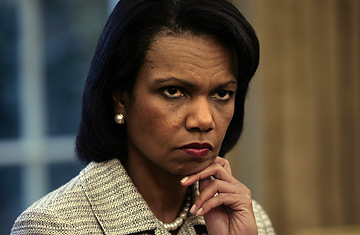
Condoleezza Rice
"The compelling forcing mechanism is that this government is not going to survive its own people if it doesn't take control of the situation in Baghdad," Rice said, adding, "And this unfolds over a period of time, and so there's a quid pro quo here. We are prepared to do the augmentation and surge if they're prepared to live up to their obligations."
Rice said she opposed giving Maliki a hard deadline at this moment, but she emphasized that American patience is limited. "I think in the next few months you are going to know whether or not this is working," she said. "They bring forces in starting February 1st. They bring in another set of forces February 15th. And I think from then on you'll have a good sense of how this is unfolding. So it's not as if there is a date, at six months, we'll know and then we have to do something dramatic. This is going to happen over a period of time. So you've got time to adjust. You've got time to go to them and say, you're not getting it done."
On the eve of a week-long swing through the Middle East and Europe, Rice said that she sees an opening for peace between Israel and the Palestinians that has not existed for years, noting that recent statements by Israeli Prime Minister Ehud Olmert and Palestinian President Mahmoud Abbas signaled that "they're circling each other. And the question is, is this therefore a time to accelerate work on the roadmap, accelerate it in a way that doesn't just focus on today's issues— movement and security, movement and access—as important as those are, but starts to understand what the political horizon might be for this Palestinian state?"
Although many experts believe the odds are overwhelmingly against Rice's efforts to broker a peace agreement and establish an independent Paelstine, given the weakened political positions of both Israeli Prime Minister Ehud Olmert and Palestinian President Mahmoud, Abbas, Rice insisted that she was "actually in a better strategic position certainly than... in '01, but maybe ... ever."
Rice said that her journey was meant to listen to regional leaders and get to the question at the heart of the matter: "Can you really start to move in a way that gives you a chance to establish a Palestinian state?" Rice says she hopes to capitalize on the political unpheaval in the Palestinian territories and signs that Hamas' popularity is fading. "In some ways, the pressure on Hamas seems to be coming from inside the territories where the inability to govern because of the international embargo, which by the way when we started down this road people said oh, this will never work, you won't isolate Hamas. Well, in fact, we have isolated Hamas. The international community has isolated Hamas. And now I think the pressure because they can't govern is leading them to seek other possibilities."
During a 30-minute interview, Rice added that:
—She would not rule out the possibility that U.S. troops might cross the Iraq border into Iran in pursuit of Iranians suspected of moving weapons to Iraqi militias. But she said she trusts the expertise of Gen. Peter Pace, chairman of the joint chiefs of staff, who believes that the Iranian arms networks can be broken up with intelligence and interdiction inside Iraq.
—She recently questioned Chinese officials about their plan to invest $16 million to develop a natural gas field in Iran. "We've made clear the downsides of investing in Iran," she said. While the secretary hasn't asked China point blank to abandon the plan, she has let Chinese officials know that investing in Iran while it is under U.N. Security Council sanctions for refusing to stop its suspect nuclear activities is "a financial risk and a reputational risk."
—North Korea may soon return to multilateral negotiations aimed at dismantling its nuclear weapons program in exchange for economic aid. Despite an inconclusive round of talks in December, with China "putting pressure on the North Koreans do to more," Rice said, "it's certainly the best alignment of forces for a possible solution that I've seen in a while."
